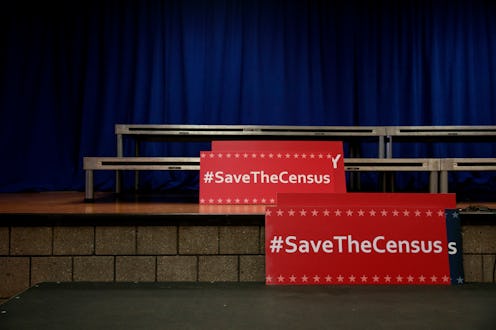News
A Judge Blocked Trump's Census Citizenship Question & It Could Go To The Supreme Court

The 10-year count of how many people live in the United States cannot include a question about citizenship, a federal judge ruled Tuesday. The census has huge implications for everything from federal funding to a state's congressional seats. Whether or not the 2020 census includes Trump's citizenship question may ultimately depend on the Supreme Court, Bloomberg reports.
"Hundreds of thousands — if not millions — of people will go uncounted in the census if the citizenship question is included," U.S. District Judge Jesse Furman wrote. In the 277-page opinion, Furman also said Secretary of Commerce Wilbur Ross "violated the law" and "violated the public trust" because of the manner in which he tried to institute the change; the question had not appeared on the census since 1950.
Furman started his opinion by noting the official position of the Census Bureau from 1960 onwards: Including the question would "depress" the count for "hard-to-count" groups like Latinos because they might fear the information could be used against themselves or loved ones.
Furman said past secretaries of Commerce had also followed that line until last year, when Ross tried to institute the question. It was to read, "Is this person a citizen of the United States?" The judge writes that Ross's decision to add it was "arbitrary and capricious."
That manner of enacting the change is illegal according to the Administrative Procedure Act (APA), on which the plaintiffs — 18 states and DC, many cities, and NGOs — based part of their argument. The judge noted that Ross didn't inform Congress three years in advance, as is required. And when he announced the change, Ross "concealed its true basis rather than explaining it," the judge wrote, which is also required by law.
The other basis on which the plaintiffs challenged the law was the Due Process Clause of the Fifth Amendment; they claimed the question was instituted as a way to discriminate against "immigrant communities of color." Furman did not find that this was the case, but he did note that it was not possible to know without deposing Ross, something that did not happen because the defense appealed to the Supreme Court and successfully stopped it.
Dale Ho, the director of the ACLU’s Voting Rights Project, praised the ruling in a statement provided to The Daily Beast. "The ruling is a forceful rebuke of the Trump administration’s attempt to weaponize the Census for an attack on immigrant communities," Ho said in the statement. “The evidence at trial, including from the government’s own witness, exposed how adding a citizenship question would wreck the once-in-a-decade count of the nation’s population."
He added, "The inevitable result would have been—and the administration’s clear intent was — to strip federal resources and political representation from those needing it most."
The citizenship question is still asked on the American Community Survey, which goes to about one out of every 36 households, but conservative groups like the Heritage Foundation argue that it's limited in scope.
This may not be the final decision on the matter. Furman, in his opinion, notes that further litigation is likely, and explains that is why he wrote such a long opinion — to detail all the facts of the case for the appeals process so that it may move as quickly as possible. The questions for the 2020 census must be finalized by June.